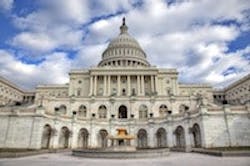Water Leaders Head to Nation’s Capitol to Promote Investment in Cities
On Capitol Hill Sept. 10, 2014, water sector leaders from across the country as part of the WaterWorks! campaign invited Washington to join them in investing the hundreds of billions of dollars required to strengthen the nation’s water infrastructure, helping bolster America’s workforce and sharpen the nation’s competitive edge.
“From agriculture to manufacturing to transportation, America’s economy runs on water,” said Kevin Faulconer, mayor of San Diego. "Whether it's brewing a San Diego craft beer or providing electricity for millions in New York, our cities depend on reliable water infrastructure – and we need to invest now so that when it comes to our future, the glass is half full."
Yet just last year, the American Society of Civil Engineers reported that U.S. water and wastewater systems are close to failing, giving the systems a “D” grade.
“It’s estimated that we need to spend $4.8 trillion over the next 20 years in order to fix and maintain the country’s current water systems and preserve existing service levels,” said Houston Mayor Annise Parker. “We need to join hands today and invest for tomorrow.”
The water industry is rising to the challenge. According to new research from the Water Research Foundation and the Water Environment Research Foundation, 30 of the large utilities from around the country will invest $233 billion over the next decade and generate more than half a trillion dollars in U.S. economic output.
Earlier this year, San Francisco Mayor Ed Lee galvanized mayors and cities through a resolution that was adopted at the U.S. Conference of Mayors Annual Meeting in Dallas. The resolution called for a renewed partnership across sectors to accelerate investment in water infrastructure in order to drive job creation, economic growth, and prepare communities to be resilient in the face of climate change.
“Neither industry nor government can do this alone,” said Susan Story, president and CEO of American Water. “Each has a critical role in enabling the next great American idea. In addition to the $230 billion spent by these 30 public utilities, American Water will invest more than $5 billion in the next five years in water infrastructure. Each sector plays a critical role.”
According to the study, the utilities are responsible for 36,500 high-quality, direct jobs that help workers enter the middle class and further grow American competitiveness. More than 289,000 permanent jobs will be supported annually over the next decade.
“Jobs in the water and wastewater industries can’t be outsourced; this is local work done by people living and working right in our communities,” said Baltimore Mayor Stephanie Rawlings-Blake, co-chair of the Water Council of the U.S. Conference of Mayors. “These jobs offer competitive salaries as well as opportunities for training and advancement. Simply put: when water works, America works.”
The range of organizations participating in Washington demonstrates the recognition of the water sector’s economic importance. The events were co-hosted by: American Society of Civil Engineers, Building America’s Future, National Assn. of Counties, National League of Cities, National Urban League, U.S. Conference of Mayors, and the Value of Water Coalition (American Water, American Water Works Assn., Assn. of Metropolitan Water Agencies, CH2M Hill, MWH Global, National Assn. of Clean Water Agencies, National Assn. of Water Companies, United Water, Veolia, Water Environment Federation, Xylem Inc., and U.S. Water Alliance).
The 30 surveyed utilities serve 83 million people across the nation—more than 25% of the total U.S. population.
Source: CH2M Hill
